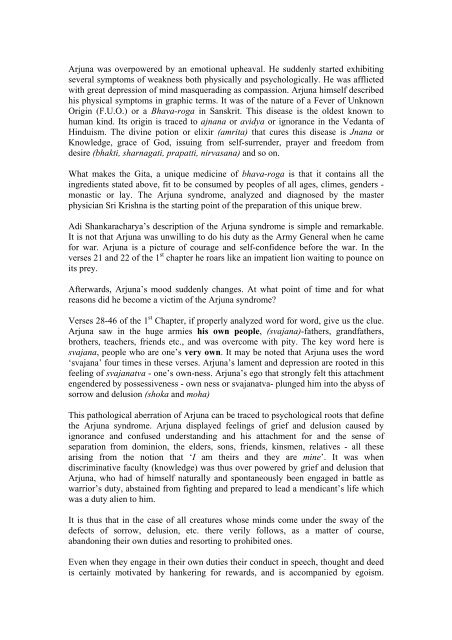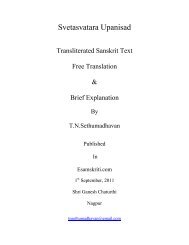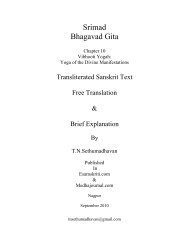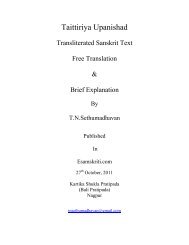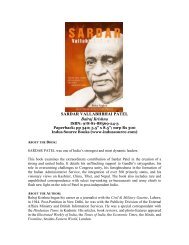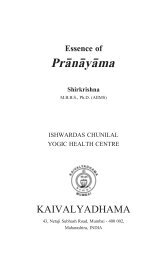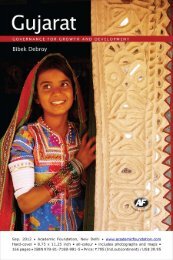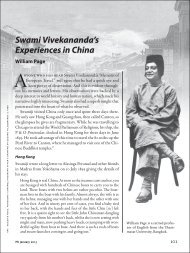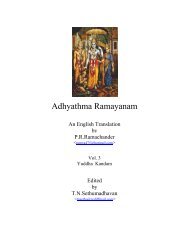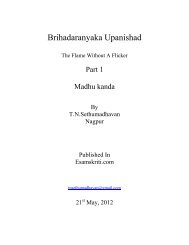SRIMAD BHAGAVAD GITA - Esamskriti.com
SRIMAD BHAGAVAD GITA - Esamskriti.com
SRIMAD BHAGAVAD GITA - Esamskriti.com
- No tags were found...
You also want an ePaper? Increase the reach of your titles
YUMPU automatically turns print PDFs into web optimized ePapers that Google loves.
Arjuna was overpowered by an emotional upheaval. He suddenly started exhibitingseveral symptoms of weakness both physically and psychologically. He was afflictedwith great depression of mind masquerading as <strong>com</strong>passion. Arjuna himself describedhis physical symptoms in graphic terms. It was of the nature of a Fever of UnknownOrigin (F.U.O.) or a Bhava-roga in Sanskrit. This disease is the oldest known tohuman kind. Its origin is traced to ajnana or avidya or ignorance in the Vedanta ofHinduism. The divine potion or elixir (amrita) that cures this disease is Jnana orKnowledge, grace of God, issuing from self-surrender, prayer and freedom fromdesire (bhakti, sharnagati, prapatti, nirvasana) and so on.What makes the Gita, a unique medicine of bhava-roga is that it contains all theingredients stated above, fit to be consumed by peoples of all ages, climes, genders -monastic or lay. The Arjuna syndrome, analyzed and diagnosed by the masterphysician Sri Krishna is the starting point of the preparation of this unique brew.Adi Shankaracharya’s description of the Arjuna syndrome is simple and remarkable.It is not that Arjuna was unwilling to do his duty as the Army General when he camefor war. Arjuna is a picture of courage and self-confidence before the war. In theverses 21 and 22 of the 1 st chapter he roars like an impatient lion waiting to pounce onits prey.Afterwards, Arjuna’s mood suddenly changes. At what point of time and for whatreasons did he be<strong>com</strong>e a victim of the Arjuna syndrome?Verses 28-46 of the 1 st Chapter, if properly analyzed word for word, give us the clue.Arjuna saw in the huge armies his own people, (svajana)-fathers, grandfathers,brothers, teachers, friends etc., and was over<strong>com</strong>e with pity. The key word here issvajana, people who are one’s very own. It may be noted that Arjuna uses the word‘svajana’ four times in these verses. Arjuna’s lament and depression are rooted in thisfeeling of svajanatva - one’s own-ness. Arjuna’s ego that strongly felt this attachmentengendered by possessiveness - own ness or svajanatva- plunged him into the abyss ofsorrow and delusion (shoka and moha)This pathological aberration of Arjuna can be traced to psychological roots that definethe Arjuna syndrome. Arjuna displayed feelings of grief and delusion caused byignorance and confused understanding and his attachment for and the sense ofseparation from dominion, the elders, sons, friends, kinsmen, relatives - all thesearising from the notion that ‘I am theirs and they are mine’. It was whendiscriminative faculty (knowledge) was thus over powered by grief and delusion thatArjuna, who had of himself naturally and spontaneously been engaged in battle aswarrior’s duty, abstained from fighting and prepared to lead a mendicant’s life whichwas a duty alien to him.It is thus that in the case of all creatures whose minds <strong>com</strong>e under the sway of thedefects of sorrow, delusion, etc. there verily follows, as a matter of course,abandoning their own duties and resorting to prohibited ones.Even when they engage in their own duties their conduct in speech, thought and deedis certainly motivated by hankering for rewards, and is ac<strong>com</strong>panied by egoism.


